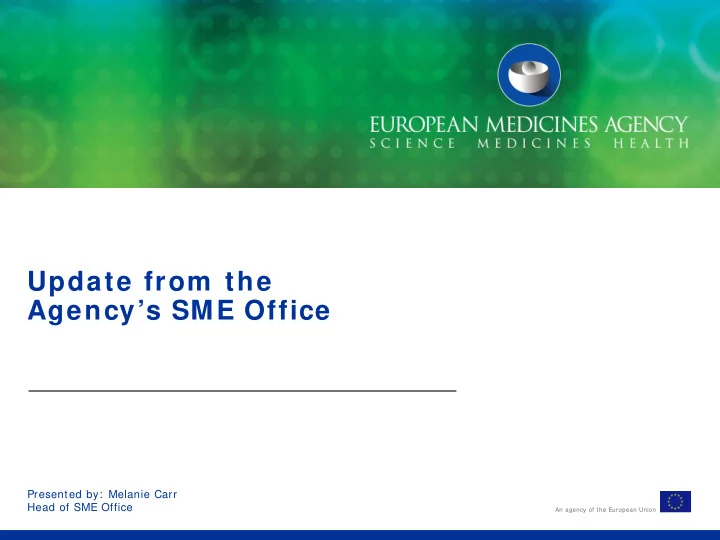

Update from the Agency’s SME Office Presented by: Melanie Carr Head of SME Office An agency of the European Union
Update from SME office Scientific and Regulatory Advice: Why? Where from? How? When? - Profile of SMEs registered with EMA - Recent experience with scientific advice - SMEs in the centralised procedure - Closing remarks 2
Experience with SMEs to date… . 512 companies assigned SME status currently From 26 countries across EEA 40% micro, 34% small, 26% medium Majority human, 32 vet, 34 human/ vet & 66 consultants Public register of companies launched in 2010 3
Product pipeline – medicinal product categories Diagnostic & im aging products Vaccines 9% 10% Therapeutic m edicines 81% 4
Product pipeline – substance/ product categories Other Foods 10% 5% Vaccines Chemicals 6% 42% Medical devices 11% Advanced therapy Biologicals medicinal products 15% 11% Categories relate to distinct products in the pipelines or ‘combined’ substances/ products 5
Product pipeline – product development stages Marketing Research/ Discovery 12% 15% (Pre) Registration 12% Pharm aceutical developm ent 16% Clinical confirm atory 12% Preclinical Clinical exploratory 17% 16% 6
Support to SMEs Regulatory assistance: > 260 SMEs received direct regulatory assistance Scientific advice (SA): > 300 SME’s in scientific advice Applications for marketing authorisation (MAA) 61 submitted MAAs (human & vet medicines) Provision of translations for 21 SMEs 7
Scientific advice/ Protocol assistance in 2010 Non-SME SME Total number of requests for 2010 = 398 250 SME requests = 88 (22.11% ) 5 2 200 (22.22% ) Num ber of requests 17 150 (19.32% ) 14 (26.92% ) 5 100 1 8 2 (20.83% ) 50 7 1 3 8 1 9 0 Initial SA Follow -up SA Initial PA Follow -up PA Types of requests 8
Scientific Advice 2006-2010 SMEs Phase I V Phase I 1% 17% Phase I I 21% Phase I I I 61% 9
Scientific Advice 2006-2010 SMEs Pre-clinical 32% Clinical 47% Qualit y 21% 2010 Multidisciplinary requests: Quality+ Preclinical+ Clinical: 24% 10
Status of SME Applications for Marketing Authorisation for Human Medicines 2006 2007 2008 2009 2010 Total No. of applications 10 11 12 4 13 50 submitted Positive - 1 5 8 4 18 Negative - 1 2 - - 3 Withdrawals 1 3 6 6 1 17 Dec 2005- Dec 2010
MAA outcomes over time for SMEs For medicines for human use 9 8 7 6 5 4 3 2 1 0 2006 2007 2008 2009 2010 positive opinions negative/withdrawals Overall success rate for SMEs 47% vs 75% for all companies 12
Questions raised & response time Average number of major objections: 4 for positive MAAs (from 0 to 10) 10 for negative/ withdrawn MAAs (from 1 to 34) Clincal efficay 30% Quality 43% Preclinical Clinical safety 10% 12% Clincal efficacy Preclinical Clinical safety Quality Response time on average: 7 months 13
Most frequent major objections in SME applications with negative outcomes -Quality -Non-clinical -Clinical Efficacy -Clinical Safety 14
Examples of Major Objections “ Quality ” • Process documentation incomplete • Process validation incomplete • Levels of impurities too high • Setting of specifications not justified • Lack of demonstrated consistency of lots • Comparability between different sites not addressed • Lack of GMP Certification • Stability data lacking 15
Distribution of 8 most frequent major objections in quality for SME applications Inadequate control of DS/DP 6% GMP compliance issues Lack of stability data / shelf 6% life determination 22% Lack of batch to batch consistency 9% Insufficient manufacturing process documentation 9% Insufficient Manufacturing Process validation 22% Specifications not adequately justified 1 3% Impurity/related substances profiling not adequately detailed 1 3% 16
Examples of Major Objections “Non- clinical” • Need to provide evidence of pharmacological activity • No biodistribution study provided reflecting the intended clinical application • Design of repeated dose toxicity studies not to current standards • Need to justify relevance of the species and doses chosen • Toxicity studies do not reflect intended clinical scheme of dosing • Lack of data concerning impurities • Local tolerance should be investigated with product intended for marketing 17
Distribution of non-clinical major objections for SME applications Ot her Pharmacodynamics 15% 25% Specific t est s missing 15% Toxicit y st udy design Pharmacokinet ics 25% 20% 18
Examples of Major Objections “Clinical” • Discrepancy between studied patients & proposed indications • Insufficient clinical package – one pivotal study • Inadequate trial design • Efficacy not demonstrated to significantly robust level • Primary endpoint is not statistically significant • Choice of dose not sufficiently justified • Predefined criteria for clinical relevance not met • Inconsistency in statistical methods between protocol & report • Multiplicity issues • Data do not allow comprehensive evaluation of safety profile 19
Distribution of major objections relating to clinical efficacy for SME applications Marginal/ No clinically Other relevant efficacy 15% 20% Validity of clinical trial data 7% General issue on study Analysis/ robustness of design pivotal data 7% 15% I nadequate duration of treatm ent or insufficient long Dose regim en justification term f/ u Pharm acokinetics relating to clinical efficacy 13% 8% 15% 20
Distribution of major objections relating to clinical safety for SME applications RMP/ PhVig system Other 12% Safety profile 4% 24% Lack of interaction studies relating to safety 12% Safety database (size/ quality/ duration) 48% 21
Closing Remarks Observations: With increasing experience can identify areas where SMEs encounter problems Major objections run high particularly in area of quality and clinical efficacy Objections raised highlight need for scientific advice in specific areas Recommendations: Early Scientific advice is strongly encouraged Maximise dialogue with regulatory authorities through various entry doors as development proceeds 22
Scientific ATMP Innovation SME Paediatric Orphan Advice Certification Task Force The various entry doors: for scientific advice & regulatory assistance 23
Thanks to following colleagues for contribution to this presentation: • Laetitia Radal • Tarita Toufexi • Nikos Zafiropoulos • Cathrin Budnik • Constantinos Ziogas Thank you for your attention Thank you for your attention 24
Recommend
More recommend